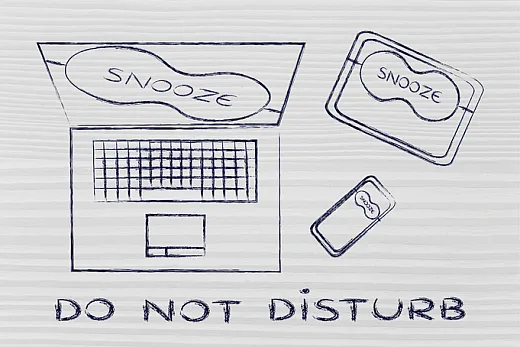Managing and Structuring Your Time in Graduate School

As graduate students, we are regularly advised to be wise with our time and strict with our schedules. Most of us are extremely aware of the limited nature of our time and how it is constantly dwindling away. For most students, effective time management can control and streamline the many responsibilities of graduate school. For others, effective time management can be the difference between completing their degree with funding or without. But what does it mean to be good at time management? After all, time management is just planning and structuring the time spent on different tasks. None of us would get to graduate school without demonstrating some competency in time management, yet so many graduate students feel like they can't keep up. After polling many of our peers, we've put together some advice from current and former graduate students on what it means to effectively structure and manage time as graduate students.
Understanding the Timeline of a Graduate Student
Effectively managing your time starts by gaining an understanding of your timeline as a graduate student. We recommend that students sit down early in their program and determine the deadlines associated with receiving their specific graduate degree at their university. These deadlines will form the backbone of your time as a graduate student and can be tremendously beneficial as they establish the structure of how your time is spent. For example, the maximum allowable time to graduate with a master's degree from Purdue University is four years while at Auburn University, the limit is five years. These deadlines will vary among universities, departments, and degrees, so it is essential to check both the university's and the department's deadlines for your degree.
Once you've determined these large deadlines, write them down. These serve as the longest possible deadline for your time as a graduate student. However, as most students are aware, these deadlines are far longer than most budgets will allow for. So, after gathering your university's and department's deadlines, schedule a meeting with your PI (primary investigator) to discuss the expected timelines associated with your funding. Most graduate students will be working on research associated with specific grants and budgets, which usually have expected timelines for planning, research, analysis, and completion of deliverables, such as publications, outreach materials, or technical reports. Start by determining when your funding is expected to end and what your PI's expectations are. Most of the time, these funding deadlines will be the same as what your PI expects from you—but not always—so it is important to talk about this with your PI.
Once you have this information, you will have the backbone structure of your degree. You can begin inserting the exact deadlines outlined by the university and department into whatever calendar you most frequently refer to. As one student we spoke with suggested, including them on both your personal calendar and your work calendar reduces the odds of missing the essential deadlines that determine your graduation. These deadlines can include the date and semester that your research proposal needs to be submitted to the university, the date and semester that doctoral students must take their comprehensive exams, the last allowable date for your defense, and the date that your thesis or dissertation must be submitted to the university and signed off on by your committee, etc. Not only will having these deadlines outlined in a calendar prevent students from missing major deadlines, but it also allows them to visualize their graduate school experience in its entirety. Seeing the “big picture” of your timeline will facilitate better long‐term planning and reduce the stress of the unknown.
Managing Time: Long Term
After you've identified the major deadlines and established the large‐scale timeline of your graduate study, you can begin long‐term planning. One of the most common pieces of advice given to us by the current and recently finished graduate students was to prioritize long‐term planning. We recommend that students establish long‐term goals through multi‐year planning (project management), annual goals, and semester‐long goals.
When interviewing students, most wished they'd established better project management practices—such as establishing long‐term timelines—earlier during their degree. Due to the length of time that it takes to develop research projects, many people avoid outlining the many stages of their research projects and setting goals for their completion. However, without the structure of long‐term project planning, students often struggle with keeping their projects organized and moving forward, which can easily lead to getting behind schedule.
Some of the students we interviewed recommended project management software—such as Trello or Jira—to help visualize the different stages of research projects and stay organized. Others recommended developing Gantt charts to stay organized and visualize the different stages of research projects. There are many guides available online for both approaches, and each rely on the same principles of long‐term planning. Both require identifying the key stages of a project, identifying major tasks associated with each stage, and developing rough timelines for the completion of each stage. This commonly includes literature review, identification of project objectives, method development, data collection, data analysis, writing, editing, and journal submission. Your PI, committee, and mentors will be able to help guide you during the development of long‐term project plans, but we recommend ensuring that you give yourself plenty of time for each stage of your projects. Table 1 demonstrates the basics of project planning.
Year 1 | Year 2 | ||||||||||||||||
|---|---|---|---|---|---|---|---|---|---|---|---|---|---|---|---|---|---|
| A | S | O | N | D | J | F | M | A | M | J | J | A | S | O | N | D | |
| Literature review | X | X | X | X | X | ||||||||||||
| Objectives | X | X | |||||||||||||||
| Methods | X | X | X | X | X | ||||||||||||
| Data collection | X | X | X | X | X | ||||||||||||
| Data analysis | X | X | X | X | |||||||||||||

While our example shows one project, your long‐term planning should include all of your projects, coursework, and any other tasks and deadlines associated with your time as a graduate student. We recommend including your research proposal, comprehensive exams, conferences, outreach efforts, and involvement with academic societies (like participation with the ASA, CSSA, and SSSA Graduate Student Committee). The structure provided by this planning makes it a lot easier to manage your time and prioritize your tasks during the semester as you can visualize which tasks need to be accomplished to complete the various stages of your projects by key dates. Many of the students we interviewed that used these techniques discussed how it reduced the number of tasks that they fell behind on and helped them check on the pace of their progress. These timelines can be adjusted if you complete tasks quicker than expected or if some tasks take longer. We can't recommend this enough as keeping track of your progress makes it easier to reach out for help from your peers and advisers when needed.

Managing Time: Short Term

Once you have established your long‐term plans and timelines, it becomes much easier to structure your time in the short term. You've already broken down your largest tasks into different stages—each with their own estimated timeline—and have already identified the individual tasks that comprise those stages. Every student we interviewed recommended that graduate students sit down at the start of their week to plan it out using upcoming deadlines and order of importance. We highly recommend determining when you are most productive as this will help you plan out your days. Some like to work on their most difficult tasks early in the day and save the easier and shorter tasks for later in the day. Others like to ease into their workday by starting with their quickest tasks before moving onto their more difficult or time‐consuming tasks. Likewise, some students like to complete all of their tasks with hard deadlines at the start of the week while others aren't concerned about when they are completed as long as they are completed on time. Regardless of which of these strategies is most effective for you, planning out your week into more manageable chunks of time and prioritizing your most important tasks is an extremely valuable skill to develop in graduate school. Find what works for you, and do your best to stick to it.
Final Thoughts
By structuring your time in graduate school through long‐ and short‐term planning, you are breaking up your workload into actionable goals and tasks. This is the principle behind effective time management and one of the most essential skills for graduate students. Having covered this, we'd like to go over some of our final tips for time management. We can't recommend enough being disciplined with your time and sticking to your plans. Several students we interviewed discussed in length how sticking to their plans allowed them to develop surety and self‐confidence as they navigated graduate school.
For many of us, sticking to our plans means limiting distractions. Distractions are everywhere. One of the biggest sources of distraction for many of us are our phones. There are numerous ways to limit distractions from your phone, including simply turning it off or leaving it in another room if the temptation is too much. Emails are another source of endless distractions. Depending on your workplace, some students find great success by allocating a set amount of time to emails at specific times of the day. Others like utilizing the zero‐inbox method where they work to get their inbox to zero by the end of the day. Find the strategy that works for you! Other students find that their office is a source of constant distractions, whether through their office mates or through having students stop by unannounced. If you are required to work from your office, set office hours for the classes you TA and have discussions with your office mates about having designated time for focused work. If you aren't required to work from the office, try to find a location where you are the least distracted. Libraries, other buildings on campus, coffee shops, bookstores, and more can often provide functional workspaces.
Being disciplined with your time doesn't mean working around the clock with no personal or social life. Instead, it helps prevent your workload from encroaching on your personal time and social life. Schedule time for rest, friendships, unstructured time, or vacation. Designate time in your week for taking care of your well‐being, whether through time in the gym, walks around campus, time with friends, or whatever you find most restorative. You can designate these times in your work calendar by setting your availability to away. Or you can turn off work‐related notifications on your computer and phone during your off‐hours. However you accomplish it, creating these boundaries with your personal time will improve your performance at work.
Potentially our most important piece of advice for managing your time as a graduate student is to learn how and when to say no. We have a lot of responsibilities as graduate students, and we also have a lot of opportunities. These opportunities and responsibilities can often seem impossible to turn down or say no to. However, you can't do it all. Look at each opportunity as it presents itself, consider your schedule and long‐term goals, and give yourself time to decide whether it will expand on your goals or infringe on your ability to complete them. If you have already committed to an opportunity, consider asking for help or accommodations, like deadline extensions. Delegate responsibilities when needed.
CONNECT WITH US!
If you would like to give us feedback on our work or want to volunteer to join the ASA, CSSA, and SSSA (ACS) Graduate Student Committee to help plan any of our activities, please reach out to Maria Teresa ([email protected]), the 2023 chair of the committee!
If you would like to stay up to date with our committee, learn more about our work, contribute to one of our CSA News magazine articles or suggest activities you would like us to promote, watch your emails, connect with us on Twitter (@ACSGradStudents) and Facebook (ACS.gradstudents), or visit: agronomy.org/membership/committees/view/ACS238/members, crops.org/membership/committees/view/ACS238/members, or soils.org/membership/committees/view/ACS238/members.
A great example of this is in your role as a TA. Many students struggle to keep on top of their own workload when managing a class, but don't be afraid to use your resources. You can't single handedly meet all of your students’ needs, so refer them to resources like the writing center, counseling center, disabilities office, etc. Don't forget to ask the professor of the class for advice and help as well. It is also important that you remember your resources. Use your resources on campus. Ask your peers for help, such as reviewing drafts of conference posters and fellowship applications. Finally, don't forget to give yourself grace. Graduate school is all about learning. You won't be perfect and things rarely go perfectly along with your plans. That is okay and all part of the process. Learn from these experiences, make adjustments as needed, and keep going. Graduate school is a marathon, not a sprint.
Text © . The authors. CC BY-NC-ND 4.0. Except where otherwise noted, images are subject to copyright. Any reuse without express permission from the copyright owner is prohibited.










